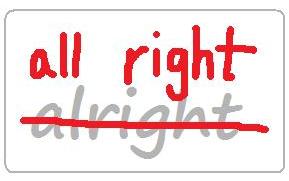Confounding Compounds - The Grammar-Us Blog - Grammar-Us
Main menu:
Confounding Compounds
Sometimes, the spoken word and the written word sound alike, but seeing the words actually in writing can be a dead giveaway as to whether the writer is a good grammarian. And, since the written word is more permanent, mistakes can haunt you for a long, long time! Compound words can be special pitfalls when they are written. Here are a few that are often misused: Everyday/Every Day: When written as one word, “everyday” is an adverb describing something as regular and repetitive. For example: “My everyday routine includes going to work.” If written as two words, however, “every day” is a time period. For example: “I do the laundry every day.”
Everyday/Every Day: When written as one word, “everyday” is an adverb describing something as regular and repetitive. For example: “My everyday routine includes going to work.” If written as two words, however, “every day” is a time period. For example: “I do the laundry every day.”
Everyone/Every One: Here’s another “every” quandary! When written as one word, you are referring to an entire group. For example: “Everyone had a great time at the party.” When split into two words, however, “every one” describes individuals. For example, “Every one of the flowers has wilted.”
Already/All Ready: When written as one word, “already” describes something that has happened beforehand. For example: “The report has already been submitted.” But, if written as two words, “all ready” describes something that has been completely prepared. For example: “Jane is all ready to go to the store.”
Alright/All Right: There is some controversy about whether or not “alright” is actually a word. To be absolutely correct in your writing, I recommend always using the two word version. However, if you do choose to use the one-
Cannot/Can Not: Some grammarians do not differentiate between the one-
There is no such word as “noone”! It is always two words (no one). “None” is a contraction of “not one.” And it is singular! For example: “None of the students is signing up for English next fall.”
- FRESH WRITING
- TWELVE ERRORS THAT MAKE A GRAMMARIAN GNASH HER TEETH
- THE WHYS AND HOWS OF WRITING AN EFFECTIVE CONSUMER LETTER
- FILLER WORDS: THE "JUNK FOOD" OF COMMUNICATIONS
- Pardon Me, Your Participle is Dangling!
- MAKE BETTER GRAMMAR A NEW YEAR’S RESOLUTION
- The Value Of Personal Letters
- How To Make Your Writing Flow
- How (And Why) To Tighten Up Your Writing
- Why Grammar Matters
- Time For Another Grammar Quiz!
- Editing: The "Make Or Break" Skill
- Proofreading: It Matters More Than You Think!
- Please Don't Ruin A Perfectly Good Tense!
- A Brave New Word
- Homophones: The Sequel
- Coulda, Shoulda, Woulda And Other Incorrectly Written Words
- More Homophones
- Time For Another Grammar Goof Quiz
- A Different Kind Of Colonoscopy (And Semi-Colonoscopy)
- Comparatives & Superlatives: The Good, The Bad, And The Ugly
- Either/Or, Neither/Nor: Decisions, Decisions!
- Let's Agree To Agree
- Avoiding Apostrophe Apocolypse
- Let's Pause To Honor The Comma!
- Three Speech Patterns That Can Compromise Professionalism
- A Hit Parade of Grammar Misses
- Negative Nancy Has Hijacked My Blog!
- Who Dat?
- Avoiding the Ill Effects of Misusing "Affect"
- How To Perfectly Use Six Irregular Verbs
- Random Ramblings
- Me, Myself and I: The Narcissist's Nightmare
- Confounding Compounds
- "All The World's A Stage...": Know Your Audience
- From The Department Of Redundancy Department: The Whole Entire Scoop On "Whole" And "Entire"
- Grammatically Challenged? There, Their, They're. It'll Be OK!
- "Its": It's a Special Exception
- We're Up And Running!